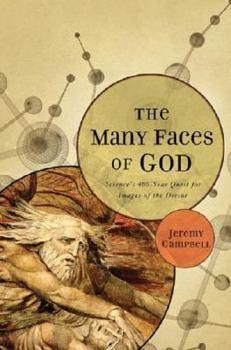The Many Faces of God: Science's 400-Year Quest for Images of the Divine
Select Format
Select Condition 
Book Overview
A grand work of philosophy and history, The Many Faces of God shows how our religious conceptions have been shaped by advances in technology and science. Beginning his narrative in the 1600s and concluding with the fervor of the millennium, Jeremy Campbell shows how Isaac Newton and his generation altered the medieval definition of God from one interpreted through divine messengers to an all-knowing, autocratic God who watched over the scientific...
Format:Hardcover
Language:English
ISBN:0393061795
ISBN13:9780393061796
Release Date:August 2006
Publisher:W. W. Norton & Company
Length:336 Pages
Weight:1.45 lbs.
Dimensions:1.2" x 6.6" x 9.5"
Customer Reviews
2 ratings
Nuanced view of the tension between science and theology
Published by Thriftbooks.com User , 17 years ago
The style of Campbell's book is somewhat idiosyncratic. One sometimes gets the impression that the author is telling you the same story again and again. In a sense, he is, but this is not always a bad thing. Campbell covers a lot of territory--from the middle ages to the 21st century--but the book really revolves around the 17th century. We hear about the same figures quite a bit (particularly Newton), but each chapter takes up a different part of the discussion between science and religion, and instead of becoming repetitive, I found that the overall picture took on ever greater depth and clarity. This is not an atheist tract. (The first reviewer was perhaps hoping that it was.) Its purpose is not polemical in the least. Its aim is to understand where the uncomfortably close relationship between science and religion got started, and how our modern strategies for talking about God are still influenced by this history. We try to imagine "where" God is in the universe, and what role he plays in its operation. Is he a designer, a maintenance man, an interventionist, a kind of information? Is he everywhere, nowhere, inside, outside? Is God more like intelligence or more like will? (The debate is not, as a previous reviewer incorrectly says, between God being "transcendent" or "willful.") These are the sorts of questions for which the book provides a very insightful and learned back-history. It is not just history, however, since Campbell repeatedly ties the past to the present. We learn almost as much about the 20th century as we do about the 17th. Campbell is utterly aware of the ironies and contradictions that riddle the world of religion. His book would never "comfort" the run-of-the-mill Christian. Nevertheless, he supports the theological enterprise. He thinks that the legitimacy of theology need not depend on its scientific plausibility. (This is partly because in an age of scientific indeterminacy, chaos theory, quantum strangeness, and other conundrums, science is becoming less certain that it will ever explain itself.) Many today feel that science can make or break religion, but it was not always so, and need not be so now. Religion brought this fate on itself, and Campbell believes it could regain its previous autonomy. A return to dogmatic religion is impossible, he says, but their is much that could still be done in our thinking about God. This "fairness" to theology may engender some disgust among "new atheists," but in the end I think it reflects the cool head and broad perspective of a historian. An elegant, erudite, and fascinating read!
Know your Physics, Newtonian and Quantum, before reading
Published by Thriftbooks.com User , 17 years ago
The potential buyer of this book needs to know the God Campbell writes about is basically confined to the Judeo/Christian/English perspective of God. Other times and views are mentioned, but the core of the book follows Campbell's experience. The book is written in 22 chapters of 10 to 15 pages. The organization allows focus on specific times and thoughts. Importantly, a basic understanding of physics, both Newtonian and Quantum, is helpful to enjoy the 2nd half of the book. Campbell gives primary emphasis toward the creator's physical creation. The mystery and wonder of life is not addressed equally. Many of us believe God is more concerned, if concerned at all, with our lives, the choices we make, and our living relationship to him than to the physical world that surrounds us. I would have enjoyed more recognition and discussion regarding the time-related, progressive revelation of God from the beginning of the Old Testament through the New Testament. Campbell minimizes the role of Jesus and the traditional views held by most Christians today. The Christian reader will wonder why so much time is given to physicists and so little attention to the writer of the Gospel of John. John 10:30: "I and my Father are one." John 14:9: Jesus says, "he that hath seen me hath seen the Father."






